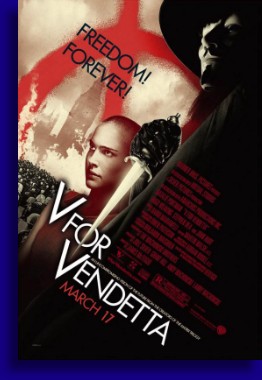
Reviewed by
Christopher Armstead



“Remember, Remember the Fifth of November
The Gunpowder Treason and Plot
I know of no reason why the Gunpowder Treason
Should ever be forgot”
So begins a poem chronicling Guy Fawkes, a rebellious young man in 1605 London so disenfranchised with the state of his government that he, along with some co-conspirators, launched a failed attempt to blow up Parliament (not funkadelic as that would be unacceptable). As we jettison ourselves 400 plus years from that point, we are introduced to V, the masked terrorist (or freedom fighter – the choice is yours) who fancies himself a modern day Guy Fawkes, complete with a Fawksian mask, determined to make the fifth of November a day to remember once again.
‘V
for Vendetta’, the controversial, politically charged thriller
from the Wachowski Brothers of Matrix fame is somewhat based on a
graphic novel by famed author Alan Moore. The setting for the film is London England, somewhere around the year 2030. From
news snippets, we are able to glean that the United States is embroiled
in civil war and ravaged by disease making the entire nation a pariah. England
has survived but not without grave costs, as biological terrorist
attacks have killed untold thousands resulting in the curtailing of
most civil rights, forcing continuous martial law, zero tolerances of
any dissimilarity, and launching the ascension of the Hitleresque Adam
Sutler into supreme power.
Borne from this chaos is V. Though his identity is very much a mystery, we know that he is a survivor of brutal concentration camp experiments which have bestowed him with heightened senses and athletic quickness, and that he is determined to wake up the apathetic British populace. He makes his grand debut on the night of November 4th, first by saving a the fair Evey (Natalie Portman) from rape minded Fingermen (i.e., the Gestapo), then by allowing Evey to witness his first terrorist (or freedom) strike as he blows up the Bailey Building at the stroke midnight, or November the 5th.

How is one supposed to take this movie? It
is marketed as an action film, and it does have a couple of nice action
sequences, but you will be disappointed if that is what you are
expecting once you walk into the theater. More
than anything it is a cautionary tale about what happens when one
allows their government, in the guise of protection, to handle every
aspect of your existence. It is a powerful message and it comes across quite clearly. I
only have a passing knowledge of the novel on which this is based, so I
can’t tell you how much of the politics are in the book and how
much was added for the film, but the parallels of this fictional future
England and post 9-11 America are striking, if not a bit extreme.
Actor
Hugo Weaving having to convey a varied range of emotions while trapped
behind a mask did an outstanding job as the driven, but tortured V, and
Stephen Rae as the detective charged with bringing the terrorist to
justice also did admirable duty torn between acting within the
constraints of the law, or acting within requirements of the truth. All the performances, from Natalie Portman who has to carry much of the film to the supporting players were handled well. The question is on seeing this film is can you tolerate the politics? I could, and it’s not subtle. But I found the majority of the film interesting and compelling. Now, as the script was penned by the Warshowski’s, it tends get a little wordy (not unlike this review). Probably
needlessly so as the characters sometimes drone on literary references,
more so to let us know how well read they are as opposed to what they
are saying having any real relevance to the story (not dissimilar to
‘Architect’ speeches of the Matrix films that internet
geeks are still attempting to dissect). Though
this is a minor thing, since V is so well read, why does he insist on
watching ‘The Count of Monte Cristo’ on the tele as opposed
to re-reading Dumas? Oh yeah, I can play the ‘I’m well read, and I’m smarter than you literature game’ too.
This is one of the more thought provoking, challenging films to come out the Hollywood (or wherever) factory in quite some time. Or, because I just saw Ultraviolet the evening before, my brain has been completely reset and Sesame Street would seem intelligent. The choice is yours Freedom Fighters.
Second Opinion:
Perhaps
it’s just me, but lately, it seems that we have seen lots of
movies about people who feel oppressed by their governments, go
underground, and then “fight the power” to overthrow their
oppressors. (Maybe it is just me; after all, in the last three days, I
have watched Ultraviolet and The Island, and part of Blade Runner (just for fun). All very different movies, and of varying quality of storytelling, but thematically not dissimilar.)
The latest movie to take on this theme is V for Vendetta, the much-discussed, highly-anticipated, and provocatively political film from the Wachowski
Brothers (the team that brought you the Matrix movies). Yes, it is
being billed as an action film, but what is drawing the most attention
about this film is its overtly political message. In his review above, Chris refers to the film as
a “cautionary tale” about what can happen if people let
government run our lives. But others, mostly conservative political
commentators, read a lot more into the film, and are interpreting it as
an indictment of the current conservative course of politics in America, namely the Bush administration. Let’s talk about that for a minute, and try to diffuse this right here right now. Keep in mind that the movie is adapted from the graphic novels of Alan Moore and David Lloyd, which were written during the period
from 1981 to 1989. These comic books were inspired by Moore and
Lloyd’s political opinions at that time, about their wariness of
Margaret Thatcher’s “ultra-conservative government”.
So yes, the original angling of the story was political in nature, but keep something else in mind: other movies based on Moore’s writings include: 2005’s Constantine, 2001’s From Hell, and 2003’s League of Extraordinary Gentlemen.
Not exactly power-to-the-people, call-to-arms political thrillers,
right? Oh, and for the record, Moore has now disassociated himself from
this film. He has done so I believe because he objects to the depiction
of suicide bombers as being glorified heroes, not for political reasons.
So now we understand that the source material for the story wasn’t intending to take shots at the Bush administration. But what about the people that adapted the story and turned it into a screenplay? Was that Michael Moore writing the script wearing the Guy Fawkes mask? No, it wasn’t. Keep in mind that the Wachowskis were working on this screenplay and get it produced before Bush took office.
Not
all conservatives are fascists, and not all liberals are hippies. And
it’s possible to watch and even like a movie that deals with
political themes, even if you don’t agree with all of them. So
let’s dial down the political rhetoric here, it’s just an
innocent little movie, a “cautionary tale” after all.
How
about the movie? It’s a good film, thought-provoking, and a bit
of a challenge to wrap your head around. It’s deep and dark, as
all good comic-book hero movies should be. I liked that it was a sci-fi movie about ideas and ideologies, not just action for action’s sake.
Its judicious use of special effects really worked for the film, to
underscore the political message and not overwhelm it. And I agree with
Chris that Hugo Weaving did a respectable job as the our masked
“terrorist” hero V (how hard must it be to be commanding
and playful, yet sad and angry all at the same time, when wearing a
mask like that?).
This movie is worth seeing, on many levels.
